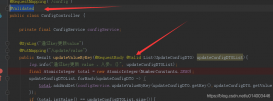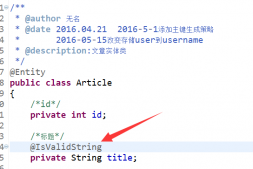1.thymeleaf简介
thymeleaf是个xml/xhtml/html5模板引擎,可以用于web与非web应用
thymeleaf的主要目标在于提供一种可被浏览器正确显示的、格式良好的模板创建方式,因此也可以用作静态建模,thymeleaf的可扩展性也非常棒。你可以使用它定义自己的模板属性集合,这样就可以计算自定义表达式并使用自定义逻辑,thymeleaf还可以作为模板引擎框架。
2.引入thymeleaf
引入依赖
在maven(pom.xml)中直接引入:
|
1
2
3
4
5
6
7
8
|
<dependency> <groupid>org.springframework.boot</groupid> <artifactid>spring-boot-starter-thymeleaf</artifactid></dependency><dependency> <groupid>org.springframework.boot</groupid> <artifactid>spring-boot-starter-web</artifactid></dependency> |
配置thymeleaf
在application.yml配置thymeleaf
|
1
2
3
4
5
6
7
8
9
10
11
12
|
server: port: 8000spring: thymeleaf: cache: false # 关闭页面缓存 encoding: utf-8 # 模板编码 prefix: classpath:/templates/ # 页面映射路径 suffix: .html # 试图后的后缀 mode: html5 # 模板模式# 其他具体配置可参考org.springframework.boot.autoconfigure.thymeleaf.thymeleafproperties# 上面的配置实际上就是注入该类的属性值 |
demo示例
创建indexcontroller
|
1
2
3
4
5
6
7
8
9
|
@controllerpublic class indexcontroller { // 返回视图页面 @requestmapping("index") public string index(){ return "index"; }} |
创建index.html
|
1
2
3
4
5
6
7
8
9
10
|
<!doctype html><html lang="en"><head> <meta charset="utf-8"> <title>title</title></head><body> hello thymeleaf!</body></html> |
创建testcontroller
|
1
2
3
4
5
6
7
8
9
|
@restcontrollerpublic class testcontroller { // 返回整个页面 @requestmapping("/test") public modelandview test(){ return new modelandview("test"); }} |
创建test.html
|
1
2
3
4
5
6
7
8
9
10
11
|
<!doctype html><html lang="en"><head> <meta charset="utf-8"> <title>title</title></head><body>hello thymeleaf! </br>by: modelandview</body></html> |
3.测试结果


4.thymeleaf基础语法及使用
1.引入标签
html标签里引入xmlns:th="http://www.thymeleaf.org"才能使用th:*这样的语法
2.引入url
@{...}
例如:
<a th:href="@{http://www.baidu.com}" rel="external nofollow" >绝对路径</a> 是访问绝对路径下的url, <a th:href="@{/}" rel="external nofollow" >相对路径</a> 是访问相对路径下的url。
<a th:href="@{css/bootstrap.min.css}" rel="external nofollow" >是引入默认的static下的css文件夹下的bootstrap文件,类似的标签有: th:href 和 th:src
3.获取变量
通过${}取值,对于javabean的话,使用变量名.属性名获取
4.字符串替换
<span th:text="'welcome to our application, ' + ${user.name} + '!'"></span>
或者
<span th:text="|welcome to our application, ${user.name}!|"></span>
注意:|…|中只能包含变量表达式${…},不能包含其他常量、条件表达式等
5.运算符
在表达式中可以使用各类算术运算符
例如 (+, -, *, /, %)
例如:th:with="iseven=(${stat.number} % 1 == 0)"
逻辑运算符 (>, <, <=,>=,==,!=)
需要注意的是使用<,>的时候需要转义
|
1
2
|
th:if="${stat.number} > 1"th:text="'execution mode is ' + ( (${execmode} == 'dev')? 'development' : 'production')" |
6.条件
if/unless th:if是该标签在满足条件的时候才会显示,unless是不成立时候才显示
|
1
|
<a th:href="@{/login}" rel="external nofollow" th:unless=${user.number != null}>login</a> |
switch thymeleaf支持switch结构,默认属性(default)用*表示
|
1
2
3
4
5
|
<div th:switch="${user.role}"> <p th:case="'admin'">user is an administrator</p> <p th:case="#{roles.manager}">user is a manager</p> <p th:case="*">user is some other thing</p></div> |
7.循环
|
1
2
3
4
5
|
<tr th:each="prod : ${prods}"> <td th:text="${prod.name}">onions</td> <td th:text="${prod.price}">2.41</td> <td th:text="${prod.instock}? #{true} : #{false}">yes</td></tr> |
8.utilities
内置在context中,可以直接通过#访问
#dates
#calendars
#numbers
#strings
arrays
lists
sets
maps
…
5.小结
本文讲述了如何在spring boot中引入模板引擎thymeleaf以及thymeleaf基础语法和实际使用
本文github地址:https://github.com/ishuibo/springall
以上就是本文的全部内容,希望对大家的学习有所帮助,也希望大家多多支持服务器之家。















